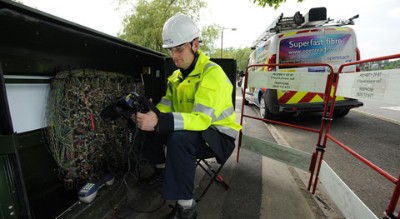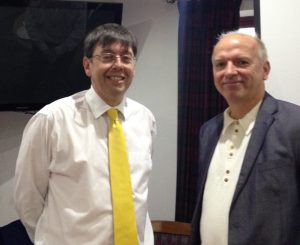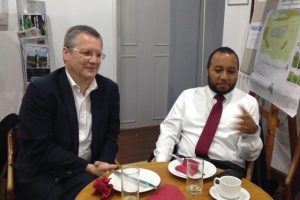REPORT BACK ON MEETING Friday October 28th 2016
with Brendan Dick, Managing Director of Regions for BT.
 “Thanks for the invite, and I think what you are doing with the Business Club is a great idea, it would be nice to see more of them…” Brendan Dick, after the meeting
“Thanks for the invite, and I think what you are doing with the Business Club is a great idea, it would be nice to see more of them…” Brendan Dick, after the meeting
The first thing you realise about BT is… it’s big, a global business with £19 billion in revenues and £3bn profits, with 75,000 employees in the UK (92,000 with EE). It once had a quarter-million employees, before privatisation. It’s been around a long time; the first commercial electric telegraph service started in 1846, so it’s the oldest telecoms company in the world.
Brendan Dick, Managing Director for the Regions for BT, a Scot who lives in Edinburgh, joined straight from university in the days when customers waited 6 weeks for a phone line. He is proud that their service record, once dire, is much improved. What High Peak Business Club realised as they listened to Brendan and his colleague Paul Bimson, responsible for the East Midlands, is that BT still retains the legacy of its time as a nationalised industry, and is struggling to catch up with kids on their mobiles.
Fibre optics is rolling out quickly now, with over 26 million premises; over 90% of the UK can access superfast broadband. “The hard part,” said Brendan, “is of course the last 5%” – some of which is in the High Peak. But only about 30% of those who could buy a high-speed service actually do. Over the summer 6 new green cabinets have come on stream in Whaley Bridge, doubtless a happy coincidence. You’d expect leaflets put through every door and a noisy advertising campaign in the local press, but no such luck. BT deploy the technology, while “Communication Providers” market their customers; in some parts of the UK, it’s local authorities. “There are the parish councils…” murmured his colleague Paul. Oh, dear, that explains a lot.

Brendan Dick, Managing Director for the Regions for BT, and club member Andy Nevett of Freedom Financial Planning in New Mills at a recent breakfast meeting.
Brendan showed us that we in the UK pay cheaply by international standards for broadband, and a lot for TV and content. That’s why BT is spending on football not footfall. The business must follow the most profitable route, and that’s not down my driveway.
When it comes to the mobile signal, we’re in a different world. Newly-acquired EE has the highest number of subscribers of any operator in Europe, so it should be big winner for BT, though the price of mobile data has fallen by a third in the last decade. Demand is high in all sectors; that’s not the problem. Servicing it is. Data volumes are growing exponentially, driven by “the kids” – you may have noticed that broadband speeds decline when the neighbour’s teenagers come home from school. That tells you they are not doing their homework but playing games online.
Meanwhile, businesses are moving to cloud computing. “Managing the migration is challenging,” said Brendan; maybe he meant that nifty providers like Amazon, who we heard from last month, are showing BT a clean pair of winged heels.

Dave Hughes of the East Midlands Chamber of Commerce (left) puts a point to Paul Bimson (right) BT Regional Partnership Director in the East Midlands.
Members started challenging him, too. What’s the point of putting down cables when you get a faster service from mobile phones? Why not reach the distant bits with a satellite? “Satellites are part of the mix,” Brendan said, “but they’re very expensive.” The best signal comes from masts, with the regulator pushing providers to share.
What about security? 900 more staff have been taken on to confront cyber-security issues. And nuisance calls? Register on the TPS (Telephone Preference Service) – which is not a BT system though everyone assumes it is; if you get a cold call from a double-glazing salesman, get as much information as you can then make a complaint on the TPS website. What about call blocking? One member recounted the story of an elderly relative using call blocking, who could then not receive calls from the ambulance service saying they were on their way to help her. Brendan has since told me he will raise this issue with colleagues.
We could have spent all morning grilling Mr Dick and were grateful for his time.

 Edward Saidu of Berg solicitors (rt) meets Andy McNish of Davis Blank Furniss (left)
Edward Saidu of Berg solicitors (rt) meets Andy McNish of Davis Blank Furniss (left)